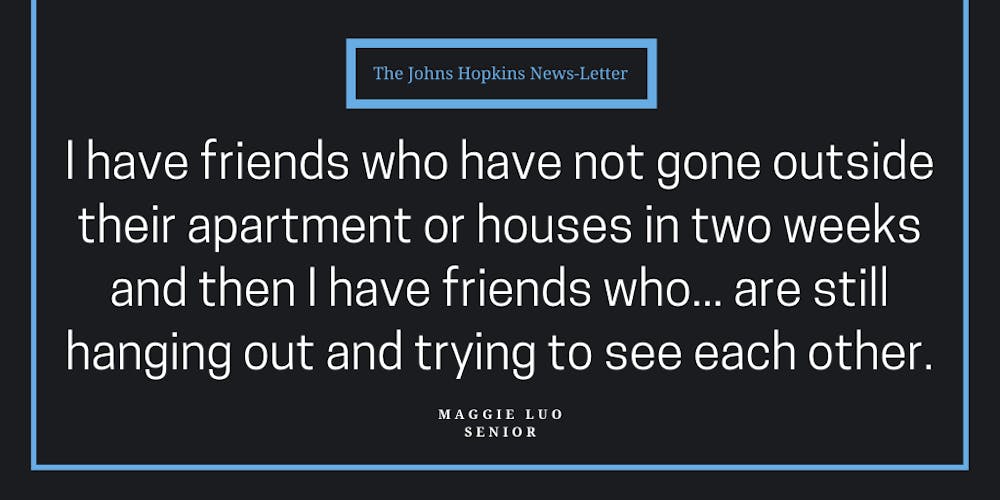On March 19, the University recommended that all undergraduate students consider moving back to their permanent address due to concerns about the spread of coronavirus (COVID-19). This followed an earlier announcement that students would not be allowed to remain in on-campus housing after March 15.
Yet many students have decided to remain in their off-campus residences.
Junior Chloe Warren explained that she decided to stay because COVID-19 had become more threatening in her hometown.
“My family lives in New York City,” she said. “The day I was supposed to fly back, my family decided to evacuate the city because they had run out of groceries and it was unrealistic to go back out.”
Others, such as junior Abigail Weyer, fear the possibility of infecting older family members. Weyer elected to remain in Charles Village after going on a spring break trip to The Bahamas.
“I decided to stay because on the off-chance I did contract coronavirus overseas, I didn’t want to go home to my parents because they are more at risk,” Weyer said. “I decided to quarantine here instead.”
Others decided to remain in order to salvage a senior year that ended abruptly.
Senior Katherine Park explained that she and her friends decided to stay in their off-campus homes after Hopkins announced that all in-person classes were cancelled for the rest of the semester.
“As a senior, a lot of my friends and I felt awful to hear that the semester got cut short. So before the situation got worse, we all decided to come back and make the most of the last semester we had at Hopkins,” Park said.
Some students pointed out that interacting with other students off-campus has been vital for their mental health.
“People are still seeing each other just to keep sane,” Warren said. “Not everyone is taking [social distancing] so seriously and I think it is really hard to do that because it is so easy to dissociate from everything that is happening.”
Senior Maggie Luo also commented on how different students living in their off-campus residences have been approaching social distancing.
“I have friends who have not gone outside their apartment or houses in two weeks and then I have friends who — we are still hanging out and trying to see each other,” she said. “I began to realize being cooped up in your house all day really starts getting to your mental health and sometimes you do need to go out and see some people.”
Junior Nikki Li, on the other hand, illustrated how necessary social distancing is for her and her housemates.
“My house is helping some freshmen that were kicked out of the dorms last minute, but because of that everyone in my house is actually at high risk for various health reasons,” Li said. “We have taken [social distancing] very seriously and not interacted with other people, we tried to plan and spread out any groceries services.”
Most of the students agreed that Hopkins administration has provided little direct support for students who have chosen to remain in Charles Village. But despite the lack of formal support, this group of students living off-campus, some argued, has become a support system of its own.
Li explained how she and her roommates helped underclassmen after their eviction from the dorms.
“My house reached out with offers to house people, help transport things or to drive people to where they needed to go,” Li said. “I know a lot of different organizations that I am in have been doing different things over Zoom to try and keep that community going.”
Weyer agreed that, while it wouldn’t be safe to actually spend time with other people, there was still a level of community between off-campus residents still living in Baltimore.
“People who are still on the campus... are like an emotional support system. Obviously we can’t really see each other because we are trying to stay at our respective homes but it is nice to talk to other people,” she said.
Students also explained that in addition to help from other students, individual University departments have clarified what services are currently available, despite a lack of cohesive University support.
“SDS [Student Disability Services] has done a really great job of reaching out to us and telling us what we can do to focus and adjust,” Warren said. “They have given us tips on how to study at home and tips on how to focus and how to set up by yourself for work. I think that has been extremely helpful.”
Services like the Blue Jay Shuttle (BJS) and the Student Health and Wellness Center (HelWell) continue to run for the students that remain in the Charles Village area. Luo explained that these have improved her experience of staying near campus.
“I use BJS just to shuttle around the place and to get to Giant. I also depend on HelWell for certain prescriptions and they have been super nice in accommodating and providing that as well,“ she said.
Students also noted that staying in Charles Village in their off-campus housing has helped them adjust to the online courses.
“You are in the same environment, so it still feels like you are in school,” Weyer said. “If I were at home it would have been a little harder. It would have just felt weird to log into a college class from my childhood room.”
Park echoed this sentiment.
“I have two younger siblings. Not being distracted by my home environment, it’s just a lot easier to get work done at my place on the campus,” she said.





